初中英语时态总结(较简单)讲解
初中英语时态8种基本时态讲解
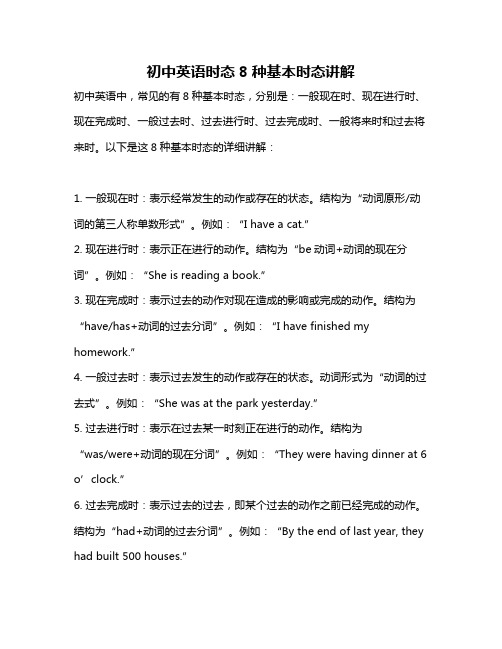
初中英语时态8种基本时态讲解初中英语中,常见的有8种基本时态,分别是:一般现在时、现在进行时、现在完成时、一般过去时、过去进行时、过去完成时、一般将来时和过去将来时。
以下是这8种基本时态的详细讲解:1. 一般现在时:表示经常发生的动作或存在的状态。
结构为“动词原形/动词的第三人称单数形式”。
例如:“I have a cat.”2. 现在进行时:表示正在进行的动作。
结构为“be动词+动词的现在分词”。
例如:“She is reading a book.”3. 现在完成时:表示过去的动作对现在造成的影响或完成的动作。
结构为“have/has+动词的过去分词”。
例如:“I have finished my homework.”4. 一般过去时:表示过去发生的动作或存在的状态。
动词形式为“动词的过去式”。
例如:“She was at the park yesterday.”5. 过去进行时:表示在过去某一时刻正在进行的动作。
结构为“was/were+动词的现在分词”。
例如:“They were having dinner at 6 o’clock.”6. 过去完成时:表示过去的过去,即某个过去的动作之前已经完成的动作。
结构为“had+动词的过去分词”。
例如:“By the end of last year, they had built 500 houses.”7. 一般将来时:表示将来要发生的动作或存在的状态。
结构为“will+动词原形”或“am/is/are going to+动词原形”。
例如:“We will visit the museum next week.”8. 过去将来时:表示从过去的某一时刻看,将来要发生的动作或存在的状态。
结构为“would+动词原形”或“was/were going to+动词原形”。
例如:“He said he would come back soon.”以上就是初中英语8种基本时态的讲解,希望对你有帮助!。
初中英语五种时态讲解
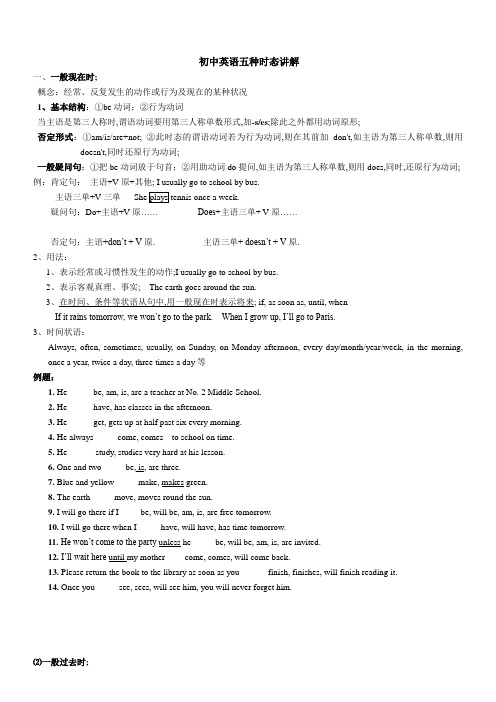
初中英语五种时态讲解一、一般现在时;概念:经常、反复发生的动作或行为及现在的某种状况1、基本结构:①be动词;②行为动词当主语是第三人称时,谓语动词要用第三人称单数形式,加-s/es;除此之外都用动词原形;否定形式:①am/is/are+not; ②此时态的谓语动词若为行为动词,则在其前加don't,如主语为第三人称单数,则用doesn't,同时还原行为动词;一般疑问句:①把be动词放于句首;②用助动词do提问,如主语为第三人称单数,则用does,同时,还原行为动词; 例:肯定句:主语+V原+其他; I usually go to school by bus.主语三单+V三单疑问句:Do+主语+V原…… Does+主语三单+ V原……否定句:主语+don’t + V原. 主语三单+ doesn’t + V原.2、用法:1、表示经常或习惯性发生的动作;I usually go to school by bus.2、表示客观真理、事实; The earth goes around the sun.3、在时间、条件等状语从句中,用一般现在时表示将来; if, as soon as, until, whenIf it rains tomorrow, we won’t go to the park. When I grow up, I’ll go to Paris.3、时间状语:Always, often, sometimes, usually, on Sunday, on Monday afternoon, every day/month/year/week, in the morning, once a year, twice a day, three times a day等例题:1. He______be, am, is, are a teacher at No. 2 Middle School.2. He______have, has classes in the afternoon.3. He______get, gets up at half past six every morning.4. He always _____come, comes to school on time.5. He ______study, studies very hard at his lesson.6. One and two _____be, is, are three.7. Blue and yellow _____make, makes green.8. The earth _____move, moves round the sun.9. I will go there if I ____ be, will be, am, is, are free tomorrow.10. I will go there when I _____have, will have, has time tomorrow.11. He won’t come to the party unless he _____be, will be, am, is, are invited.12. I’ll wait here until my mother ____come, comes, will come back.13. Please return the book to the library as soon as you ______finish, finishes, will finish reading it.14. Once you _____see, sees, will see him, you will never forget him.⑵一般过去时;1、⑴表示过去某个时间发生的动作或存在的状态; I got up late this morning.⑵表示过去的习惯或经常发生的动作;When I was in the countryside. I often swam in the river. I used to go fishing.2、结构:基本结构:①be动词;②行为动词否定形式:①was/were+not; ②在行为动词前加didn't,同时还原行为动词;一般疑问句:①was或were放于句首;②用助动词do的过去式did 提问,同时还原行为动词;例:肯定句:主语+ V过去+其他;疑问句:Did+主语+ V原……否定句:主语+didn’t+ V原3、动词的规则变化;4、时间状语:Yesterday, last night/week/year/month, last Sunday, in 1995, the other day, just now, ago等例题:1. He____be, was, were, been here a moment ago.2. They ____be, was, were, been here just now.3. The scientists _____leave, leaves, leaved, left for America yesterday.4. Last week we ______visit, visited the Science Museum.5. When I was a child, I often ____play, played football.6. The students ran out of the classroom as soon as the bell ____ring, rang, rung.⑶一般将来时;①肯定句:否定句:注:当主语为I 或we时,问句中可用shall where shall we meet tomorrow②be going to+ V原表示计划、打算做某事;用来表示近期或事先考虑过的将要发生的动作以及已有迹象表明必将发生某事,意为“打算;就要”; be going to do 将要干某事---what are you going to do next Sunday ---I am going to listen to music.Look at the clouds, there is going to rain.③现在进行时be +Ving 有时可以表示将来;常用这种结构的动词:go, come, leave, stay, start, arrive We’re leaving for London.例题:1 . _____you ____a doctor when you grow upA .Will; going to be B. Are; going to be C. Are; / D .Will; be2. I don’t know if his uncle _____. I think he _____ if it doesn’t rain.A will come; comesB will come; will comeC comes; comesD comes; will come3 . He will be back _____a few minutes.A withB forC onD in4. What time _____we meet at the gate tomorrowA willB shallC doD are5. He will have a holiday as soon as he _____the work next week.A finishes B. doesn’t finish C will finish D won’t finish6 .There _____some showers this afternoon.A will beB will haveC is going to beD are going to have7. It ____my brother’s birthday tomorrow. She _____a party.A is going to be; will haveB will be; is havingC will be; is going to haveD will have; is going to be8. Li Ming is 10 years old now, next year he _____11.A isB is going to beC will beD will to be与will区别:两者都可表示将要发生的事、将要去做某事,但它们有如下几点区别:1. 表示近期、眼下就要发生的事情,will 表示的将来时间则较远一些,如:He is going to write a letter tonight.He will write a book .2. 表示根据主观判断将来肯定发生的事情,will表示客观上将来势必发生的事情;He is seriously ill. He is going to die.He will be twenty years old.3. be going to 含有“计划,准备”的意思,而will 则没有这个意思,如:She is going to lend us her book.He will be here in half an hour.4.在有的主句中,一般不用be going to, 而多用will, 如:If any beasts comes at you, I'll stay with you and help you4现在进行时1、构成:肯定句:主语+ is / am / are +ving疑问句:Is /Am /Are + 主语+ving否定句:主语+ isn’t / am not / aren’t + ving2、用法:①表示正在进行的动作I’m reading book now.②表示现阶段正在进行的动作或状态; They are studying hard this term.3、时间状语:now , these days, 当句中有look, listen , can’t you see, can you see时Listen He is singing.例题:1. I ____write, am writing, is writing, are writing a letter now.2. Look, it _____begin, is beginning, am beginning, are beginning to rain.3. They ____study, is studying, am studying, are studying medicine at the Medical Institute of Chengde these days.4. He _____teach, am teaching, is teaching, are teaching an English lesson at this time.5 过去进行时1、结构was / were + doing2、用法①表示过去某段时间正在进行的动作---what were you doing at 9:30 last night --- I was watching TV.3、when一般接一般过去时I was doing my homework whenwhile一般接进行时WhileHe was playing basketball while she was reading books.例题:1. I _____cook, cooked, was cooking, were cooking breakfast when you arrived.____you_____ do, did, was...doing, were…doing at this time yesterday eveninghave, are having, had, were having dinner when the doorbell rang.When/ As we____ have, had, are having, were having dinner, the doorbell rang.动词基本变化形式:。
初中英语八大时态知识点详解 4
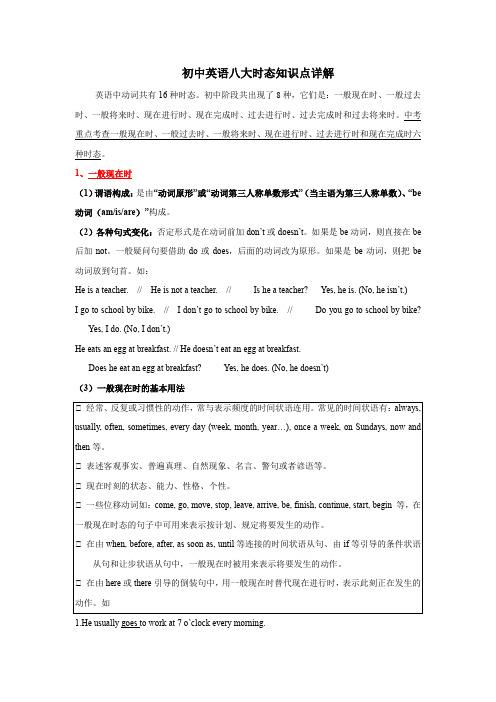
初中英语八大时态知识点详解英语中动词共有16种时态。
初中阶段共出现了8种,它们是:一般现在时、一般过去时、一般将来时、现在进行时、现在完成时、过去进行时、过去完成时和过去将来时。
中考重点考查一般现在时、一般过去时、一般将来时、现在进行时、过去进行时和现在完成时六种时态。
1、一般现在时(1)谓语构成:是由“动词原形”或“动词第三人称单数形式”(当主语为第三人称单数)、“be 动词(am/is/are)”构成。
(2)各种句式变化:否定形式是在动词前加don’t或doesn’t。
如果是be动词,则直接在be 后加not。
一般疑问句要借助do或does,后面的动词改为原形。
如果是be动词,则把be 动词放到句首。
如:He is a teacher. // He is not a teacher. // ---- Is he a teacher? --- Yes, he is. (No, he isn’t.)I go to school by bike. // I don’t go to school by bike. // ---- Do you go to school by bike? ---- Yes, I do. (No, I don’t.)He eats an egg at breakfast. // He doesn’t eat an egg at breakfast.---- Does he eat an egg at breakfast? ---- Yes, he does. (No, he doesn’t)(3)一般现在时的基本用法1.He usually goes to work at 7 o’clock every morning.2.Every dog has its day. 凡人皆有得意日。
3.Pride goes before a fall. 骄者必败。
4.The earth goes around the sun. 地球绕着太阳转。
初中所有英语时态
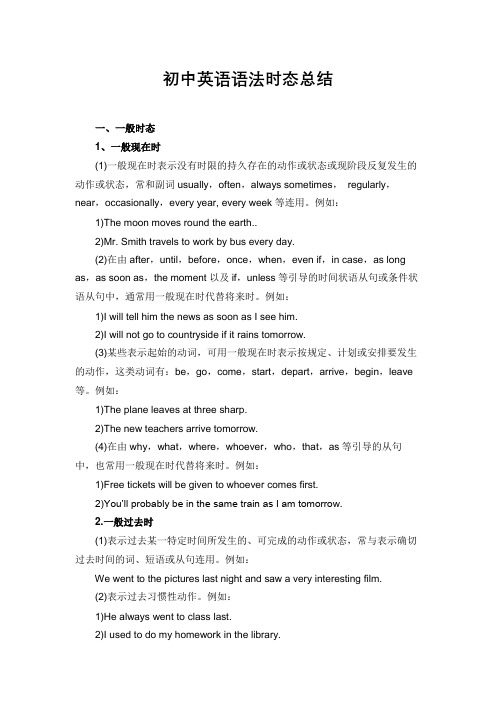
初中英语语法时态总结一、一般时态1、一般现在时(1)一般现在时表示没有时限的持久存在的动作或状态或现阶段反复发生的动作或状态,常和副词usually,often,always sometimes,regularly,near,occasionally,every year, every week等连用。
例如:1)The moon moves round the earth..2)Mr. Smith travels to work by bus every day.(2)在由after,until,before,once,when,even if,in case,as long as,as soon as,the moment以及if,unless等引导的时间状语从句或条件状语从句中,通常用一般现在时代替将来时。
例如:1)I will tell him the news as soon as I see him.2)I will not go to countryside if it rains tomorrow.(3)某些表示起始的动词,可用一般现在时表示按规定、计划或安排要发生的动作,这类动词有:be,go,come,start,depart,arrive,begin,leave 等。
例如:1)The plane leaves at three sharp.2)The new teachers arrive tomorrow.(4)在由why,what,where,whoever,who,that,as等引导的从句中,也常用一般现在时代替将来时。
例如:1)Free tickets will be given to whoever comes first.2)You’ll probably be in the same train as I am tomorrow.2.一般过去时(1)表示过去某一特定时间所发生的、可完成的动作或状态,常与表示确切过去时间的词、短语或从句连用。
初中英语知识归纳总结——动词的时态

初中英语知识归纳总结——动词的时态动词的时态(一)教学重点一般现在时在英语中,不同时间里以不同方式发生的动作或存在的状态,要用不同的动词形式来表示,动词的这种不同形式称为动词的时态。
时态从时间上划分,可分为四大类:现在时;过去时;将来时;过去将来时。
从行为上,每一类可以分为四种形式:一般式;进行式;完成式;完成进行式。
这样英语的动词合起来,总共有十六种时态,初中只需掌握其中的八种时态。
1、一般现在时(1)一般现在时表示现在的状态、习惯性的动作或主语所具备的性格和能力等。
①当动词是be时,第一人称用am,第二人称用is,其他人称用are.②当动词是实义动词时,一般用动词原形,但如果主语是第三人称单数时,动词必须用第三人称单数形式,其变化规则如下:助动词do(第三人称单数用does)构成否定句、疑问句及答语,但要注意助动词后原来的谓语动词要恢复原形。
例如:I like music.I don’t like music.Do you like music?Yes, I do No, I don’t(2)一般现在时的用法①表示经常、习惯性动作,常和often, usually, every day, sometimes, always 等时间状语连用。
如:He goes to school by bus every day.They often play football②表示能力、职业、特征。
如:Miss Gao teaches English.Do you speak Japanese?③表示客观存在。
如:The earth moves round the sun.Time and tide wait for no man.④表示已经安排好或计划好的事。
如The plane takes off at 7:30.Classes begin at 8:00⑤在时间状语和条件状语从句中,主句用一般将来时,从句用一般现在时。
初中英语八大时态归纳总结
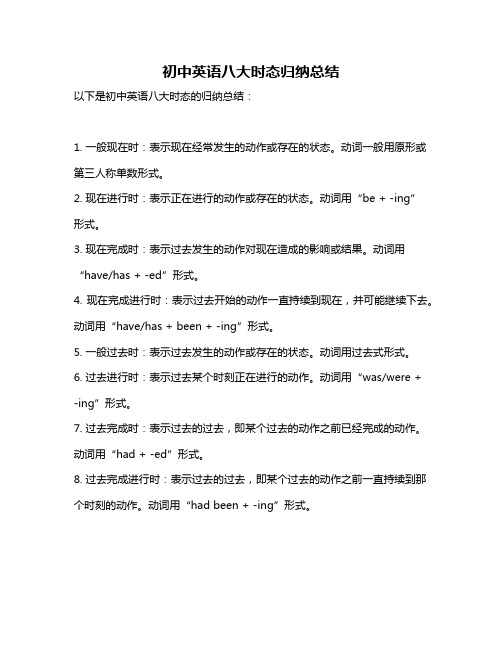
初中英语八大时态归纳总结
以下是初中英语八大时态的归纳总结:
1. 一般现在时:表示现在经常发生的动作或存在的状态。
动词一般用原形或第三人称单数形式。
2. 现在进行时:表示正在进行的动作或存在的状态。
动词用“be + -ing”
形式。
3. 现在完成时:表示过去发生的动作对现在造成的影响或结果。
动词用“have/has + -ed”形式。
4. 现在完成进行时:表示过去开始的动作一直持续到现在,并可能继续下去。
动词用“have/has + been + -ing”形式。
5. 一般过去时:表示过去发生的动作或存在的状态。
动词用过去式形式。
6. 过去进行时:表示过去某个时刻正在进行的动作。
动词用“was/were + -ing”形式。
7. 过去完成时:表示过去的过去,即某个过去的动作之前已经完成的动作。
动词用“had + -ed”形式。
8. 过去完成进行时:表示过去的过去,即某个过去的动作之前一直持续到那个时刻的动作。
动词用“had been + -ing”形式。
以上是初中英语的八大时态,理解和掌握这些时态对于英语学习和交流非常重要。
初中英语八大时态总结
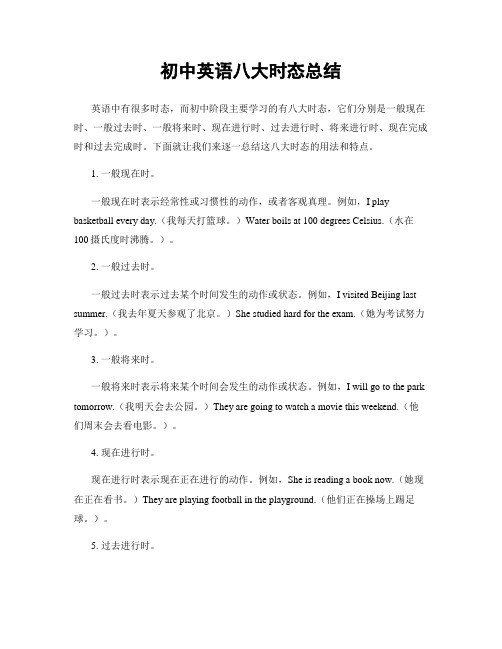
初中英语八大时态总结英语中有很多时态,而初中阶段主要学习的有八大时态,它们分别是一般现在时、一般过去时、一般将来时、现在进行时、过去进行时、将来进行时、现在完成时和过去完成时。
下面就让我们来逐一总结这八大时态的用法和特点。
1. 一般现在时。
一般现在时表示经常性或习惯性的动作,或者客观真理。
例如,I play basketball every day.(我每天打篮球。
)Water boils at 100 degrees Celsius.(水在100摄氏度时沸腾。
)。
2. 一般过去时。
一般过去时表示过去某个时间发生的动作或状态。
例如,I visited Beijing last summer.(我去年夏天参观了北京。
)She studied hard for the exam.(她为考试努力学习。
)。
3. 一般将来时。
一般将来时表示将来某个时间会发生的动作或状态。
例如,I will go to the park tomorrow.(我明天会去公园。
)They are going to watch a movie this weekend.(他们周末会去看电影。
)。
4. 现在进行时。
现在进行时表示现在正在进行的动作。
例如,She is reading a book now.(她现在正在看书。
)They are playing football in the playground.(他们正在操场上踢足球。
)。
5. 过去进行时。
过去进行时表示过去某个时间正在进行的动作。
例如,I was studying when she called me.(她给我打电话的时候,我正在学习。
)They were playing games at that time.(他们那时在玩游戏。
)。
6. 将来进行时。
将来进行时表示将来某个时间正在进行的动作。
例如,I will be having dinner at 7 o'clock tonight.(我今晚7点会在吃晚饭。
初中英语时态讲解(完整版)

英语时态讲解一般完成时进展时完成进展时现现在一般时现在完成时现在进展时现在完成进展时在Do/does Havedone Have/hasbeingHasdone Is/aredoing doing过去一般时过去完成时过去进展时过去完成进展时过去did Haddone Was/weredoing Hadbeendoing将来一般时将来完成时将来进展时将来完成进展时将Willdo Will have Willbedoing Willhavebeen 来done doing过去将来一般过去将来完成过去将来进展时过去将来完成进过Wouldbedoing去时时行时将Woulddo Would have Wouldhavebeen 来done doing时态详解:一般现在时1.一般现在时的应用(1)表示经常发生的动作或存在的状态。
常用频度副sometimes,often,always,usually,seldom 以及时间副词everyday/night/week/month/year,inthemorning,intheafternoon,intheevening,atnight做状语。
如:Heoftenstaysuplate.他常熬夜。
Wegohomeeverymonth.我们每月都要回家。
IwatchTVatnight.我晚上看电视。
(2)表示客观真理或永恒的状态。
如:Theearthtravelsroundthesun.地球绕太阳旋转。
Treesturngreeninspring.春天树木变绿。
Liquidturnsintogaswhenitishotenough.足够热时,液体变为气体。
Practicemakesperfect.熟能生巧。
(3)现阶段的状态。
常跟时间副词now连用。
如:HelivesinBeijingnow.他现在住在。
Sheisathome.她在家。
Theyworkinthatfactory.他们在那家工厂工作。
- 1、下载文档前请自行甄别文档内容的完整性,平台不提供额外的编辑、内容补充、找答案等附加服务。
- 2、"仅部分预览"的文档,不可在线预览部分如存在完整性等问题,可反馈申请退款(可完整预览的文档不适用该条件!)。
- 3、如文档侵犯您的权益,请联系客服反馈,我们会尽快为您处理(人工客服工作时间:9:00-18:30)。
初中阶段,要求学生掌握动词6种时态的基本结构(一般现在时,一般过去时,现在进行时,过去进行时,现在完成时,和一般将来时态)及它们的主要用法和区别。
了解过去将来、过去完成时态的基本用法,解题时注意找出关键词,正确判断出时态,按时态结构正确变化动词。
注意句子时态的一致性,注意对特殊时态的处理。
1、一般现在时:●用法:1)现阶段经常性,习惯性的动作。
例如:I get up at six every morning.He plays tennis once a week.2)现在的状态。
例如:My mother is a teacher. She teaches English in a school.3)客观真理。
例如:The earth goes around the sun.4)常用于一般现在时态的时间状语:often ,usually ,sometimes ,always ,every day ,never ,in the morning 等连用时。
●构成:主语是I, we, you, they和名词复数时作谓语的行为动词用原形。
主语是he, she , it和名词单数时,动主语为第三人称和名词单数时:肯定式:S+V/动词的第三人称单数否定式:S+ don't/doesn't +V+其他疑问式:Do/Does+S+V+其他简略回答:(肯)Yes,S+do/does(否)No,S+do/does not注意:have的第三人称单数为has●当主语是第一、二人称和第三人称复数以及名词复数时:肯定式: S + be +···否定式: S+ be +not + ···疑问式: Am /Is /Are + S+ ···?简略回答: (肯) Yes,S + be.(否) No,S + be.练习题:1.--- May I help you, sir?--- Yes, I bought the TV the day before yesterday, but it ______.A. didn’t workB. doesn’t workC. won’t workD. can’t work2.______ the bus until it ______..A. Get off, stopsB. Get off, will stopC. Don’t get off, stopsD. Don’t get off, will stop 3.The 70-year-old man ______ exercises in the morning.A. takesB. are takingC. tookD. will take2. 现在进行时●用法:1)说话时正在进行或发生的动作(动作是在说话时正在进行)。
例如:She is having a bath now.2)现阶段正在进行或发生的动作(但是动作并不是必须在说话时正在进行)。
例如:You are working hard today.Kate wants to work in Italy, so she is learning Italian.The population of the world is growing very fast.3)频度副词always, forever等词连用时,表示某种强烈的感情。
如:He is always trying out new ideas. (表示欣赏,表扬)4)表示按计划即将发生的动作(仅限于go, come, arrive, leave, start, fly, begin, stay 等动词)。
如:The party is beginning at 8:00 o’clock..5) 常用于现在进行时态的时间状语:now ,look,listen等。
●构成:be+ v-ing2)肯定句、否定句、疑问句形式:肯定句:S+be +V-ing否定句:S+be+not + V-ing一般疑问句:Is(Are)+S+V-ing?特殊疑问:wh_+ be + S + V-ing?练习题:1.I don’t think that it’s true. She’s ______ lies.A. tellB. tellsC. tellingD. told2.How ______ you ______ with the new job?A. do, doB. do, get alongC. are, doingD. are, getting on 3.--- Are these socks yours?--- No. Mine ______ outside on the clothes line.A. are hangingB. have hungC. hangD. hung3.一般将来时●用法:1.将要发生的动作。
例如:I will leave for Beijing tomorrow.2.将要存在的状态。
例如:This time next year I will be in Japan. Where will you be?3.打算要做的事。
例如:Are you going to watch the film on television tonight?3) 常用于一般将来时的时间状语:tomorrow next week in 2008 等。
●构成:1. 助动词will(shall)+v2. be +going to +v练习题:1. I______ for Hong Kong on Saturday. Will you go to see me off at the airport?A. am leavingB. am leftC. am going to leavingD. left2.I______ to see grandma and help her with some housework every week.A. cameB. am going comeC. comeD. will come3.We Chinese ______ the Olympic Games in 2008.A. heldB. shall holdingC. are holdingD. are going to hold 4.一般过去时●用法:1.过去发生的动作。
例如:The police stopped me on my way home last night.2.过去存在的状态。
例如:They weren't able to come because they were so busy.3. 常用于一般过去时的时间状语:yesterday,three months ago,last year,in 1979,等。
●构成:S+V-ed用动词的过去式。
作谓语的行为动词的词尾变化如下:2)一般过去时态的肯定句、否定句和疑问句形式(以be和like为例):练习题:1.Mr. Mott is out. But he ______ here a few minutes ago.A. wasB. isC. will beD. would be2.---Hi, Tom.---Hello, Fancy. I ______ you were here.A.don’t knowB.won’t thinkC. thinkD. didn’t know 3.He promised to tell me by himself when I ______.A. comeB. would comeC. comeD. had come5、过去进行时●概念:1)过去某一阶段或某一时刻正在进行的动作。
例如:This time last year I was living in Brazil.What were you doing at 10 o'clock last night?2)常用于过去进行时的时间状语:at four yesterday afternoon,then,at that time/moment 等。
●构成:was / were +v-ing1)Daddy promised me he ______ me a computerA. was boughtB. had bought C bought D. would buy2)They said they ______ do some sports if it was fine.A. were going toB. wentC. would goingD. were going6、现在完成时●概念:1)表示过去发生的动作对现在造成的影响或结果.常与already, just, ever, never, before等词连用. 如:She has never read this novel.2)表示“过去的动作”一直延续到现在并有可能继续延续下去. 常与for (后跟段时间)或since (后跟点时间)等连用.如:I have been a member of the Party for 10 years.I have been a member of the Party since 10 years ago.注:在有for 和since 引导时间状语的句子中不能用短暂性动词,应用与之相应的表示状态的词。
如:He has died for 3 years.(F)He has been dead for 3 years.(T)注:①现在完成时不能和表示明确的过去时间连用。
如:in 1998, last morning等②have/has been to 表示“去过”(去了又回来了)have/has gone to 表示“去过”(去了没回来了)如:Where has she gone?(句中所指的人不在)Where has she been?(句中作指的人在)●构成:have / has + v-ing2)现在完成时态的肯定句、否定句和疑问句形式(以be和see为例):肯定句:S+ have(has)+V-ed否定句:S+ have(has)+not(haven’t,hasn’t)+V-ed一般疑问句:Have(Has)+ S+V-ed+?特殊疑问句:wh_+have(has)+ S+V-ed+?练习题:1.--How long ______ he ______ a fever?--- Ever since last night.A. have, gotB. has , hadC. have, caughtD. did, have2.My bowl is empty. Who ______ all my soup?A. drinksB. had drunkC. has drunkD. drank3. I ______ you for a long time. Where ______ you ______?A. Didn’t seen; did, goB. didn’t see; have, goneC. haven’t seen; have, beenD. haven’t seen; have gone7、过去完成时态●用法:1、表示在过去某一时间或动作之前已经发生或完成的动作。
